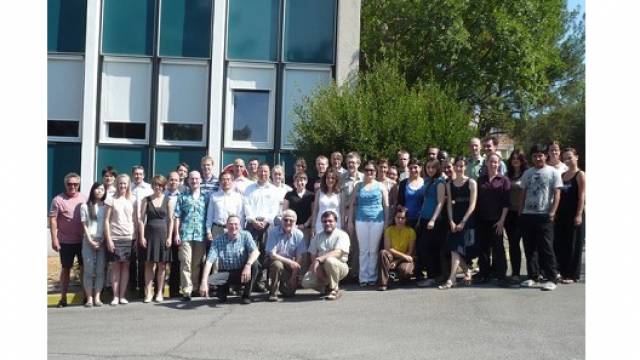The ICG Summer School, which took place in July, in Montpellier, South of France, had 34 attendees from 13 different countries. Teachers at the summer school also represented a wide range of backgrounds, with most from academia but some also from industry, providing a focus on what is achievable in practice.
On 2 July 2012, 34 students and 11 lecturers assembled in Montpellier, South of France, to participate in the fourth International Summer School for new research workers in the field of Glass Technology. The Summer School lasted from Monday to Friday and ran to a demanding schedule with 8:30 a.m. starts and 6 p.m. finishes on most days. The course content was presented in 45-minute blocks with a short discussion time at the end of each. In addition, two tutorial sessions and group project work encouraged active involvement by participants but also kept lecturers on their toes. The organization of the Summer School content was carried out by ICG’s Technical Committee 23 with local arrangements being made by made by staff of CNRS at Montpellier and the company Eventuelles, run by Mylène Boscus.
Attendee numbers increased for the third consecutive year. Altogether 13 different countries were represented; with most attendees from Europe, as well as from Japan and China. Although most attendees came from Universities, 11 of the participants were from industry. This mix of backgrounds is one of the reasons for the success of the course, stimulating the discussion that occurs between the attendees as part of their group project activities. While the target audience is those relatively new to research, in practice participants have varying degrees of experience as well as a wide range of interests within the field of glass technology, adding further depth to the overall experience for everyone.
The teachers at the summer school also represented a wide range of backgrounds. Most are from academia but some are from industry and provide a focus on what is achievable in practice. A core group of lecturers have been present at each of the summer schools to date; they with a few additional invited contributors provide a broad coverage of the subject, highlighting current topics of interest.
This year’s lecturers included Dr. Bange (Germany), Prof. Conradt (Aachen, Germany), Prof. Cormier (Paris, France), Prof. Deubener (Clausthal, Germany), Professors Hehlen and Vacher from CNRS Montpellier, Prof. Parker from Sheffield (UK), Prof. Qiu (South China University of Technology) and Prof. Takada (Asahi, Japan).
In addition each year one topic is chosen as a specific theme for one day; this year the topic was ‘Strength’. Especially invited for this session were Prof. Bao (China Building Materials Academy, Beijing, China), Prof. Hand (Sheffield, UK), Prof. George (Montpellier, France), and Prof. Rouxel (Rennes, France). Their lectures highlighted the principles governing the measurement of strength, the factors controlling its value, quality control of strength in industry, and ways of improving the strength of glass artefacts.
A new feature of this year’s course was a stimulating lecture given on the first day by Prof. Conradt, introducing unanswered questions in Glass Science. An outcome of the event is that the lecturers also hear each other’s presentations and can themselves gain something from the different teaching methods used in education.
One of the particularly successful features of the course is the group project. Attendees must give a short presentation at the beginning of the week based on their interests. They are then split into groups of about five according to their interests but with a deliberate attempt to mix their backgrounds. Each group is set an open-ended project that they must explore using their own basic knowledge, the lecture content and the internet to which they have wireless access. They are also encouraged to discuss their ideas with the teaching staff.
Following each group presentation a lively discussion ensued and at the end of the morning the lecturers had the difficult task of assessment and choosing a winning group. This year two groups particularly impressed for somewhat different reasons. One group had to come up with the features that a phone app for glass technologists should include. Their list was impressive but was also presented in a particularly lively and graphic fashion, including the imaginative name of iGlass. The second winning group were asked to suggest ways to analyse the contents of a sealed glass lachrymarium whilst maintaining its integrity and also how to determine its age. These are ancient containers used to preserve the tears of the mourners at a funeral among other things and so the task also included a consideration of the possible interaction between container and contents over its lifetime (possibly a millennium or more). The presenters not only managed to unearth an enormous quantity of information on these ancient artefacts but also came up with some very sensible suggestions on what analytical tools might be used, and the information each would yield.
At the end of the school, attendees were asked for comments on the good and not so good things about the course. This feedback was immensely encouraging and as a consequence there will certainly be a fifth summer school next year. The planned date is 8-12 July, following on immediately after the ICG Congress in Prague. Further information will be provided on the ICG web site (www.icglass.org).




